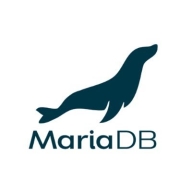

Oracle Database and MariaDB compete in the enterprise database sector. Oracle has the advantage due to its comprehensive features and scalability that cater to large enterprises.
Features: Oracle Database is renowned for its high availability, data consistency, and security, essential for enterprise environments. It supports Real Application Clusters for load balancing and Data Guard for disaster recovery. In contrast, MariaDB shines with its open-source nature, simplicity, and superior query speed. It offers good performance in specific scenarios, driven by its robust community support.
Room for Improvement: Oracle's complexity and high costs pose challenges, requiring experienced DBAs and presenting licensing hurdles. Enhancing ease-of-use features could benefit users. MariaDB could improve in clustering and scaling transactions while offering better support for complex SQL queries. Addressing these areas can enhance its competitive edge.
Ease of Deployment and Customer Service: Oracle Database involves a complex initial setup with intricate licensing constraints. Its customer support varies in responsiveness, often being costly. MariaDB, being open-source, offers a straightforward deployment experience. Its community-driven support, although not as extensive, is beneficial for general application needs.
Pricing and ROI: Oracle Database's high pricing is a barrier for smaller entities but justifiable for larger organizations due to high returns on investment when its extensive features are fully leveraged. MariaDB offers a free open-source version, with lower enterprise costs, appealing to smaller businesses seeking a cost-effective solution with a favorable cost-to-value ratio.


MariaDB is an open source relational database created by the original founders of MySQL. It is considered one of the most popular and trusted database servers throughout the world. MariaDB is a valued component found in most cloud offerings and is the default in many Linux tools. It is also widely used by Wikipedia, WordPress, and Google, among other well-known sites. Maria DB easily melds data into concise information from a vast array of applications, such as banking, online shopping, websites, and more.
MariaDB was originally created to improve MySQL performance. It is the most widely chosen database server due to the solution being super fast, robust, user-friendly, and easily scalable. MariaDB also offers a substantial ecosystem of plugins, storage engines, and numerous other valuable tools that make it very attractive for a significant offering of use cases.
The solution’s newest functionalities include compatibility with Oracle Database and Temporal Data Tables, and advanced clustering with Galera Cluster 4, which make it easier for users to research data history from any point in the past. Additionally, the most recent versions include JSON and GIS features. MariaDB is committed to staying an open source solution.
MariaDB Features
Reviews from Real Users
Faustine C., Engineering Supervisor- Corporate Data Solutions and Services at TZ Telecoms Corporation, shares, “The software provides a lot of information on what is happening inside the database. For most performance parameters it is easy to know if something is not right in the configuration or optimization which helps engineers take remedial fine-tuning measures. For example, if the database is underperforming it is easy to know which performance parameter can be adjusted to handle the workload. It is difficult to troubleshoot database issues if many performance parameters can not be monitored or debugged which is the case with some database management systems. It provides great monitoring of data storage, processing, and performance stability which is really important for real-time data storage and processing. It's a user-friendly product.”
A PeerSpot user who is a Senior Engineer at a tech services company relates, “ The solution's high availability is its most valuable aspect. We have found the product to be stable and the initial setup is pretty simple. I'd rate the solution at a ten out of ten. I'm very happy with it overall. I would recommend the solution to others. It's easy to find details about the product online and to learn about it.”
Oracle Database is a top-ranking multi-model database management system by Oracle Corporation. Through Oracle database services and products, clients receive cost-optimized and high-performing versions of Oracle Database, as well as in-memory, NoSQL, and MySQL databases. The solution is available by several service providers on premises, in the cloud, or as a hybrid installation. It can be run on vendor servers as well as on Oracle hardware, including Exadata on-premise, Oracle Cloud, or Cloud at Customer.
Users can select from various types of Oracle Database solutions, depending on what they aim to do with this product. Based on their specific needs, they can choose among options that include:
Part of this product is a fully automated database service called Oracle Autonomous Database, which facilitates the development and deployment of application workloads for organizations. It is built on Oracle Database as well as on Oracle Exadata. This service supports various data types and simplifies application development and deployment from modeling and coding to extract, transform, load process (ETL), data analysis, and database optimization. The service achieves high results in:
Oracle Database Features
Oracle Database has various features which users can utilize in their work with the solution. Among these features are the following:
Oracle Database Benefits
Oracle Database offers its users various benefits. Some of these include:
Reviews from Real Users
Paul S., president at Advance Consulting Enterprise, likes Oracle Database because it gets the job done, doesn't fail, and suitable for massively scalable applications.
An Oracle DBA at a computer software company describes Oracle Database as reliable with good performance and very good stability.
We monitor all Relational Databases Tools reviews to prevent fraudulent reviews and keep review quality high. We do not post reviews by company employees or direct competitors. We validate each review for authenticity via cross-reference with LinkedIn, and personal follow-up with the reviewer when necessary.